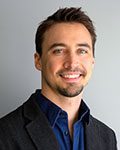Steering Photons: From Detectors and Smart Windows to Space Propulsion and Quantum Forces

Speaker: Jeremy N. Munday
Affiliation: University of Maryland
Abstract: Photons are remarkable bundles of energy that can be used to perform a variety of tasks. In this talk, I will present our latest research describing how we control photons to create novel devices ranging from near-IR Si detectors and solar energy harvesters to space propulsion technologies based on photon pressure (light sails) and devices that exploit the quantum nature of the vacuum. In the first part of my talk, I will discuss the concept of hot carriers (i.e. charge carriers with excess kinetic energy) and how they can be used to make near-IR imaging detectors. Next, I will demonstrate the concept of electrically controlled optical components and show how we use these devices to create self-powered smart windows for building integration, attitude control devices for light sails, and as a way to modify the optoelectronic response of a semiconductor. Finally, when no photons are present, quantum fluctuations of electromagnetic fields still exist. In the last part of the talk, I will discuss how we can control these fluctuations (sometimes called virtual photons) to create forces and torques on nanoscale objects, exploiting this effect (i.e. the Casimir effect) for fundamental science and technological applications.
Biography: Dr. Jeremy N. Munday is an Associate Professor in the Department of Electrical and Computer Engineering at the University of Maryland, College Park. He received his PhD in Physics from Harvard University and was a postdoctoral scholar at Caltech prior to his appointment at Maryland. His research themes range from quantum electromechanical phenomena (such as the Casimir effect) to fundamental solar energy conversion processes with an emphasis on the optics, photonics, and thermodynamics of such systems. He is a recipient of the NSF CAREER Award, ONR YIP Award, the OSA Adolph Lomb Medal, the IEEE Photonics Society Young Investigator Award, the SPIE Early Career Achievement Award, and the NASA Early Career Faculty Space Technology Research Award.
For more information, contact Prof. Ben Williams (bswilliams@ucla.edu)
Date/Time:
Date(s) - Nov 17, 2017
11:00 am - 12:30 pm
Location:
E-IV Tesla Room #53-125
420 Westwood Plaza - 5th Flr., Los Angeles CA 90095
